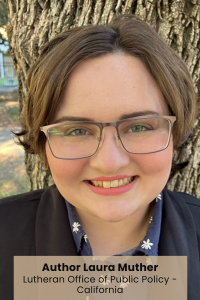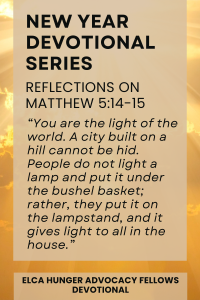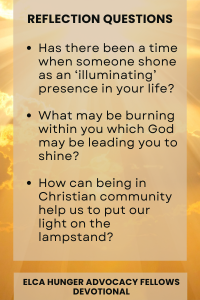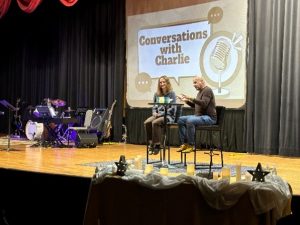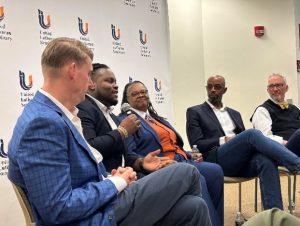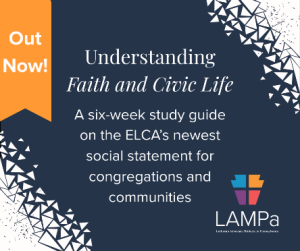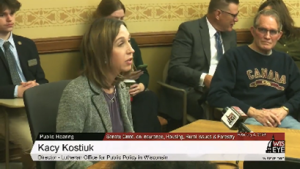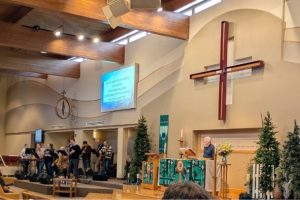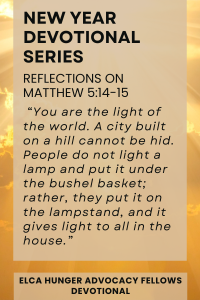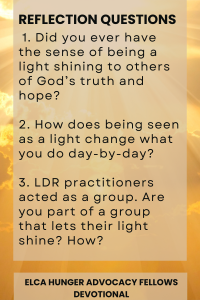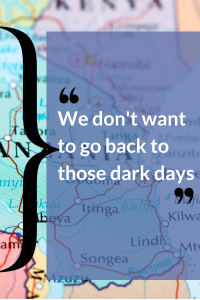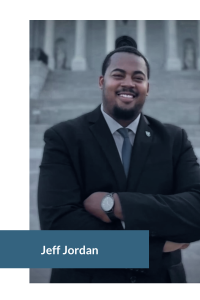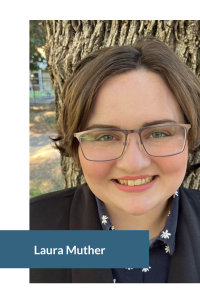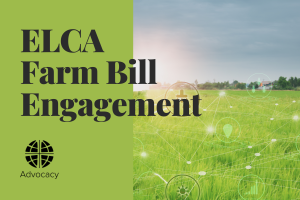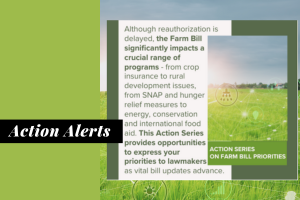WHAT IS A SIGN-ON LETTER | IMPACT OF SIGN-ONS | DECISION PROCESS | UPDATED LIST
 Our advocacy takes many forms with long-term and immediate aims, and ELCA Witness in Society staff are active equipping members, building influential relationships with policy makers, networking strategically with other concerned partners, researching policy pieces and their impacts and inviting our ELCA Advocacy Network to action at impactful moments.
Our advocacy takes many forms with long-term and immediate aims, and ELCA Witness in Society staff are active equipping members, building influential relationships with policy makers, networking strategically with other concerned partners, researching policy pieces and their impacts and inviting our ELCA Advocacy Network to action at impactful moments.
One timely way we can act as ELCA is to sign on with others to offer pointed comments to decision makers when developments demand.
WHAT IS A SIGN-ON LETTER
A “sign-on letter” is an advocacy tool that acts like a petition to members of Congress or other policy decision makers, often addressing an immediate issue or impending vote. Sign-on letters are drafted and circulated among organizations with similar policy goals to ask other organizations to join, showing support for a policy position or value by adding their name.
The Witness in Society team may recommend listing the ELCA as an organization on a sign-on letter. Some letters are tailored for individual sign-ons, usually by the head of an organization. In the ELCA, most individual sign-ons are done by the ELCA presiding bishop.
IMPACT OF SIGN-ONS
Sign-on letters are frequently used when swift and targeted action will have an impact on decision-makers. The aim is to provide education on an issue, articulate shared organizational values on a subject and urge the recipient to take a specific action or vote. Ecumenical and interfaith sign-on letters summarize broad consensus in the faith community. In addition to receipt by individual members of Congress or Executive Branch officials for example, they may be used in constituent meetings and shared as public statements as well.
DECISION PROCESS
The ELCA joins sign-on letters following careful analysis by the Witness in Society team, sometimes in consultation with other staff. The Senior Director for Witness in Society makes the final determination for a sign-on. Sign-on letters require a foundation in ELCA social teaching and relevance to ELCA public policy advocacy priorities. Sign-on letters are also evaluated for accuracy of facts and the tone of the statement, seeking language that will educate or persuade, avoiding hyper-partisan or inflammatory language. Witness in Society staff are strategic about the use of sign-on letters, asking if a joint letter is the right approach at this time; how the letter will be disseminated and used to create awareness among members of Congress, the Administration and throughout the ELCA; what the impact of not signing a letter might be; and discerning whether a standalone effort from the ELCA would have greater impact at the given point-in-time or may be preferable to state distinctly the ELCA’s position.
LAST UPDATE: 2/12/26
Our ministry of advocacy is a witness to God’s love for our neighbor, ourselves and for all creation. Here are recent statements made with ELCA support. Use the link in the date to read a public posting* of the sign-on letter in full.
2026
- Jan. 29 – “We write to you as the Circle of Protection, a coalition of national church bodies and related ministries representing the diversity of Christianity in this country. …We support needed protections for people from ICE agents’ behavior, or guardrails in these appropriations bills. We call on Congress to assert more accountability in the Department of Homeland Security (DHS) spending bill.” Circle of Protection letter to Congress [ELCA signer: Witness in Society Senior Director]
2025
- Dec. 16 – “We, the undersigned 104 civil society organizations, write to respectfully request the inclusion of the United Nations Relief and Works Agency for Palestine Refugees in the Near East (UNRWA) in the President’s implementation of Gaza’s recovery.” Letter to Secretary of State Marco Rubio.
- Dec. 10 – “As religious organizations, representing hundreds of thousands of people of faith, we write in opposition to the series of proposed rules by the U.S. Fish and Wildlife Service (FWS) and National Oceanic and Atmospheric Agency to weaken the Endangered Species Act (ESA) regulations, published November 21, 2025. We believe every creature is a beloved part of God’s creation, endowed with worth and purpose. When a species is pushed towards extinction, a reflection of God’s glory is dimmed.” National Religious Partnership for the Environment faith public letter comment to Secretary of the Department of the Interior.
- Dec. 9 – “We, the undersigned 130 national, state, and local legal services; humanitarian, human, civil, economic development, labor rights, faith-based, and veteran organizations, write to address the administration’s actions in the days since the violent attack that occurred in Washington, D.C. on November 26. We grieve for the families impacted by this unimaginable tragedy and call for justice and accountability for the victims. While doing so, we also strongly urge you to immediately reverse course and fully restore our nation’s humanitarian and immigration programs, free from discriminatory or hateful policies and rhetoric.” Letter to President Trump.
- Nov. 25 – “On behalf of the undersigned national faith-based organizations working to reduce poverty and support those experiencing food insecurity, we write to share our concern about the announced termination of the U.S. Department of Agriculture (USDA) Household Food Security Reports.” Letter to Secretary of Agriculture.
- Oct. 31 – “…Guided by our diverse faith traditions, we share moral outrage that the Trump administration intends to abandon those facing the world’s most severe humanitarian and displacement crises including in Sudan, Democratic Republic of the Congo, Afghanistan, Myanmar, and elsewhere… We call on the administration to reaffirm America’s longstanding commitment to protecting people fleeing persecution by fully restoring the refugee program to reflect and align with humanitarian values.” Interfaith Immigration Coalition Press Release. [Accompanying comment included from ELCA Witness in Society Senior Director]
- Oct. 29 – “We write as the Circle of Protection, a coalition of national church bodies and related ministries representing the diversity of Christianity in this country… We call on Congress to negotiate an end to the government shutdown, and we strongly urge the administration to do everything in its power to ensure families receive full SNAP benefits in November. This includes immediately using SNAP’s contingency funding and USDA’s transfer authority.” Statement from Christian Leaders in the Circle of Protection.
- Oct. 20 – “As organizations committed to civil society and open civic space, we, the undersigned, are gravely concerned by the U.S. government’s (USG) decision to impose sanctions under Executive Order (EO) 14203 against three leading Palestinian human rights organizations – Al-Haq: Law in the Service of Man (Al-Haq), Al-Mezan Center for Human Rights (Al-Mezan), and the Palestinian Centre for Human Rights (PCHR) — for engaging with the International Criminal Court (ICC) to seek investigations into war crimes committed by Israel in Gaza.” Joint Statement.
- Sep. 16 – “We, the undersigned 78 national, state, and local organizations representing resettlement agencies, direct service providers, faith-based organizations, and human rights groups, write to urge you to do everything in your power to ensure that the administration upholds its moral and legal obligations to fully restore the congressionally established U.S. Refugee Admissions Program (USRAP) and to take immediate legislative and oversight actions to fully restore refugees’ access to basic healthcare, nutrition assistance, and social services, ensuring that newly arriving families have the opportunity to thrive. Letter to Congress.
- Sep. 12 – “Intensified Israeli military attacks on Gaza City and forced displacement orders for the entire city are leaving families with an impossible dilemma: flee and risk death on the road and in overcrowded displacement areas, or stay and face relentless bombardment in their shelters… Let our goods enter. Let us work. Stop this assault.” Humanitarian and civil society organizations letter.
- Sep. 10 – “On behalf of the Interreligious Working Group on domestic human needs (DHN) and partners, we are reaching out to share our support for inclusion of Senate Amendment 3503 in a manager’s package of amendments to the National Defense Authorization Act, (S. 2296) or group of amendments for which roll call votes will be held… which helps military families, veterans, and other Americans access affordable housing.” Letter to Senate leadership.
- Aug. 26 – “Churches for Middle East Peace (CMEP) joined twenty church based organizations in calling for Israel to halt its planned military offensive in Gaza City. With famine already declared in Gaza, further military operations will only cause further suffering and death for a civilian population without anywhere else to go.” Joint statement.
- Aug. 13 – “We, the undersigned organizations, write to express our grave concern regarding the preventable humanitarian catastrophe and mass starvation in the occupied Gaza Strip. We urge you to use all available tools, including the suspension of U.S. security assistance in compliance with section 620I of the Foreign Assistance Act, in order to secure an immediate surge in humanitarian assistance and an end to the ongoing atrocities.” Letter to members of Congress.
- Aug. 13 – “On behalf of the undersigned organizations and our hundreds of thousands of members and supporters, we submit these comments to the Environmental Protection Agency on its Request for Comments on the repeal of the National Emission Standards for Hazardous Air Pollutants: Coal- and Oil-Fired Electric Utility Steam Generating Units, also known as the Mercury and Air Toxics Standard (MATS). As faith based institutions, we are heartsick by the proposal to weaken the Mercury and Air Toxics Standards (MATS) for power plants.” Public comment submitted by National Religious Partnership for the Environment et al.
- June 26 – “We, the 45 undersigned national religious organization, express our deep concern and reaffirm the core moral imperatives of our faith traditions in light of H.R. 1, the budget reconciliation bill.” Letter to Senate Majority and Minority leaders.
- June 24 – “We urge Congress to exercise its constitutional responsibility by scrutinizing any military action against Iran and by supporting the Iran War Powers Resolutions (S.J.Res.59 and H.Con.Res.38), introduced by Senator Kaine and Representatives Khanna and Massie.” Letter to Congress with 19 national Christian denominations and organizations.
- June 23 – “As organizations representing a diverse range of faith traditions, we write to express our support for the bipartisan Religious Workforce Protection Act (RWPA)… Unless Congress acts, communities will increasingly be forced to part with the men and women who have faithfully served them for years, and religious exercise will be hindered in their absence.” Letter to Senate Majority and Minority Leaders.
- June 19 – “We, the Circle of Protection… urge members of Congress to oppose the rescissions bill and the Administration’s proposed cuts in international aid in FY2026 appropriations.” Letter to President Trump and members of Congress [signed by ELCA Senior Director, Witness in Society].
- June 18 – “We respectfully urge the Administration to reverse its decision, uphold previous U.S. commitments and reaffirm the Paris Agreement. We collectively affirm that Faiths Are Still In.” Statement from over 45 national, state, and local faith organizations.
- June 5 – “While the White House argues that these rescissions will make the United States safer, stronger and more prosperous, we, the undersigned 78 organizations, lament the proposal will achieve the opposite. We urge you to oppose the rescission of any foreign assistance funds related to urgent human needs, including food, medical and humanitarian aid, and to global stability and resilience, such as peacebuilding, poverty-focused development assistance, climate resilience and good governance.” Letter to Members of Congress led by Friends Committee on National Legislation.
- May 21 – “The interfaith community holds a shared belief affirming every person is made in God’s image and deserves to thrive, not just survive. Our sacred texts call us to love our neighbors and accompany the vulnerable. Our federal government should reflect these sacred ideals and support the common good. The House Budget Reconciliation bill fails to reflect love and compassion and instead harms those we are called by faith to serve. We urge each Member of the House to VOTE NO on this bill” [full text]. Letter to members of the Houses.
- May 19 – “We write as organizations variously focused on U.S. national security and foreign policy, human rights, the protection of civilians, peacebuilding, and humanitarian response… We urge you to proactively offer a principled vision for diplomatic negotiations towards an inclusive, just peace for Ukraine and stability for the region. Letter to members of Congress.
- May 2 – “We, the undersigned 21 non-profit and faith-based organizations, representing Americans in all fifty states, write to express our concern regarding the reported proposal to close several U.S. embassies in Africa, including in the Central African Republic and South Sudan, as well as the Republic of Congo, Eritrea, the Gambia, and Lesotho. In particular, embassies in Bangui, Central African Republic, and Juba, South Sudan are critical to implementing programs and diplomatic efforts that promote our national security and have widespread bipartisan support.” Coalition letter to Secretary of State.
- May 2 – “We, the undersigned organizations –a diverse coalition of religious organizations, children’s advocates, agriculture partners, maternal and public health organizations, and retail and industry stakeholders – urge Congress to build on this success with continued, bipartisan investment in WIC. We specifically urge appropriators to work with the Department of Agriculture to provide sufficient funding for the projected caseload and program costs at the time of bill passage, and to protect the scientific integrity of WIC’s food packages.” Letter to House and Senate Appropriations Committee leaders.
- April 10 – “We, the undersigned 85 local and national faith-based organizations, urge you to consider the constitutional rights and inherent dignity of all immigrants as you draft the budget reconciliation bill.” Letter to leadership of Senate and House Committees on Homeland Security and Governmental Affairs and Committees on the Judiciary.
- Mar 20 – “The undersigned institutional investors recognize the urgent need for comprehensive immigration reform to ensure economic stability, workforce resilience, and sustainable growth. Sound and just immigration policy is not only a matter of human rights but also an economic imperative that strengthens our workforce, enhances innovation, and secures the competitiveness of U.S. businesses in the global economy… We call on Congress to reject piecemeal immigration-related orders and directives that only prolong uncertainty and create confusion and instead come together to enact comprehensive immigration reform that protects all stakeholders and fosters long-term economic growth.” Investor Statement through the Interfaith Center on Corporate Responsibility to members of Congress.
- Mar 6 – “We, the over 1,800 national, state, and local organizations representing communities across the country, urge the House and Senate to reject proposals for any cuts or attempts to weaken SNAP and the child nutrition programs.” Letter to House & Senate leadership.
- Mar 3 – “We, the undersigned 124 civil society organizations, write to respectfully request your support for the restoration of United States funding to the United Nations Relief and Works Agency for Palestine Refugees in the Near East (UNRWA) through cosponsorship of the forthcoming ‘UNRWA Funding Emergency Restoration Act of 2025.’” Letter to members of Congress.
- Feb 26 – “As faith leaders, we are deeply troubled at the impact this current debt crisis is having on the lives of the poorest and most vulnerable across the world… We must have a fair and functional global debt system. The Jubilee tradition calls for debts to be forgiven, land restored, and slaves freed. This Biblical practice embodied justice, mercy, and reconciliation, offering a renewed covenant with God and harmony within the community.” Letter to G20 finance leaders, signatories include Presiding Bishop Eaton.
- Feb 24 – “We, the undersigned organizations, members of the Alliance to End Hunger, urge you to protect, strengthen and fully fund federal food and nutrition programs in Fiscal Year 2025 and FY 2026 budget appropriations, reconciliation and continuing resolutions. U.S. domestic food assistance programs are critical to keeping people strong and secure in all corners of our nation – in rural, suburban, and urban areas. Federal nutrition programs support farmers and jobs all along the food chain and brace up local economies.” Letter to House and Senate leadership.
- Feb 14 – “We implore you to use your position to immediately restore foreign aid programs, reopen critical refugee resettlement programs, and fully reinstate USAID.” Letter to Secretary of State Marco Rubio.
- Feb 12 – “On behalf of the millions of Americans represented by our faith, humanitarian, health, education, foreign policy, development, human rights, business, labor, peace, women’s advocacy, science, and environmental organizations, we strongly urge you to oppose efforts to shut down U.S. foreign assistance, including the critical work of the U.S. Agency for International Development (USAID).” Coalition letter to House and Senate.
- Feb 12 – “As members and partners of the Interfaith Working Group on Foreign Assistance, a network of Christian, Jewish, Muslim, Hindu and Buddhist organizations working in solidarity with the world’s most vulnerable people, we write to you to express our grave concerns over the sudden order to stop lifesaving foreign assistance work around the globe and the dismantling of USAID.” Letter to House & Senate leadership.
2024
- Dec. 20 – “We, the undersigned faith-based organizations, write to urge you to use the weeks remaining in your administration to commute all federal death sentences and prevent the likelihood that the incoming administration will resume executions.” Letter to President Biden.
- Dec. 2 – “As a network of faith-based organizations who care deeply for the most vulnerable, whom we believe are made in God’s image, we know the path forward to end HIV/AIDS as a public health threat by 2030. We hear from faith-based organizations and institutions across the globe that PEPFAR saves lives and they are grateful to the United States. A clean, five-year reauthorization of this life-saving program signals to the world that no matter the challenges – the U.S. is still leading and committed to saving lives and ending HIV/AIDS as a public health threat.” Letter to Chairman/Ranking Member of Senate and House committees on foreign affairs.
- Nov. 20 – “On behalf of the undersigned members of the Alliance to End Hunger, we respectfully request that you provide sufficient funding for critical programs that save lives, protect livelihoods, and build resiliency and self-sufficiency as you conference the FY25 Agriculture, Rural Development, Food and Drug Administration bill.” Letter to leadership of House & Senate Subcommittees on Agriculture, Rural Development, Food and Drug Administration.
- Nov. 20 – “On behalf of the undersigned members of the Alliance to End Hunger, we respectfully request that you provide sufficient funding for critical programs that save lives, protect livelihoods, and build resiliency and self-sufficiency as you conference the FY25 State, Foreign Operations bill.” Leadership of House Subcommittee on State, Foreign Operations, and Related Programs and the Senate Committee on Appropriations.
- Oct. 22 – “We, the undersigned organizations, urge you to cosponsor and vote in favor of the four joint resolutions of disapproval introduced by Senators Sanders, Welch, and Merkley regarding several specific major arms sales to the government of Israel.” Letter U.S. senators.
- Oct. 18 – “We write as U.S. Christian faith leaders deeply concerned by the continuing injustice, suppression of rights, and disregard for international law that has endured for decades in Israel/Palestine.” Churches for Middle East Peace letter to Trump and Harris campaigns.
- Aug. 21 – “The undersigned 103 state, national, and local faith-based organizations, write to call on your administration to urgently address backlogs in work permit processing and continue efforts to enhance, expand, and extend access to work authorization for immigrants and asylum seekers alike.” Coalition letter to DHS Secretary Mayorkas, Domestic Policy Council Director Tanden, and U.S. Citizenship and Immigration Services Director Jaddou.
- July 31 – “We represent a diverse coalition of church bodies and related organizations that include 100 million people. We are writing together as a demonstration of the breadth of support in the Christian community for the Child Tax Credit expansion that will come to the Senate floor this week.” Circle of Protection letter to members of the U.S. Senate.
- July 26 – “We the undersigned human rights, civil rights, and social justice organizations call on you to implement an immediate arms embargo on the Israeli government in order to save lives.” Letter to President Biden and members of Congress.
- July 23 – “As global Christian leaders committed to peace and justice and the recognition of the image of God in all humanity, we abhor the ongoing violence that has now continued for more than nine months between Hamas and the Israeli military… Against this catastrophic backdrop, we have called before and call again now, with heartfelt insistence, for a comprehensive and permanent ceasefire, for the return of hostages, and the release of Palestinian prisoners held without due process. Churches for Middle East Peace letter to President Biden.
- July 22 – “We, the 64 undersigned organizations, urge you to safeguard and invest in critical funding for peacebuilding, human rights, humanitarian aid, migration, international climate finance, poverty-focused development assistance and related accounts in the Fiscal Year 2025 Department of State, Foreign Operations, and Related Programs (SFOPs) appropriations bill. Letter to Senate Appropriations Subcommittee on SFOPs Chair Coons and Ranking Member Graham.
- July 9 – “We, the 1,422 national, state, and local organizations representing communities across the country, urge the House and Senate to develop a Farm Bill that ensures that the Supplemental Nutrition Assistance Program (SNAP) is protected and strengthened and that benefit adequacy, equitable access, and program administration remain core tenets of the program.” Letter to members of Congress.
- June 27 – “We write to you today on behalf of 26 faith-based organizations with heavy hearts, compelled by the harrowing tales of suffering and devastation unfolding in Sudan at this very moment… in the hope of inspiring decisive action to alleviate their suffering.” Letter to President Biden.
- June 18 – “We write to you as the Circle of Protection, leaders of diverse church bodies and Christian organizations… We hope this Congress will still be able to pass three important pending bills, with priority attention to their impact among people struggling with hunger and poverty… Regarding the Farm Bill… Regarding FY2025 appropriations… expansion of the Child Tax Credit…” Circle of Protection letter to President Biden and members of Congress.
- Jun. 10 – “As you determine priorities for the Fiscal Year 2025 Agriculture, Rural Development, Food and Drug Administration Act, as members of the Alliance to End Hunger, we respectfully urge you to provide robust funding for global nutrition and food security programming. Specifically, $2 billion for Food for Peace Title II, $265 million for McGovern-Dole Food for Education and Child Nutrition, and $500 million for agricultural research.” Letter to House Appropriations Committee Agriculture, Rural Development, Food and Drug Administration Subcommittee Chairman and Ranking Member.
- May 22 – “On behalf of the organizations listed below, we ask that you fund global HIV/AIDS programs in the Fiscal Year (FY) 2025 no less than $6.79 billion for Global Health Programs at the Department of State, including $5.14 billion for the President’s Emergency Plan for AIDS Relief (PEPFAR), $1.65 billion for the Global Fund to Fight AIDS, Tuberculosis and Malaria, as well as ensure that the programs are governed by policies that expand access to health care, uphold human rights, and help to put the world on track to end AIDS by 2030.” Coalition letter to House & Senate Committees for Appropriations leadership.
- May 9 – “We write to express our deep concern regarding the plight of the Cuban people. The combined effects of failed U.S. foreign policies and Cuban economic policies have created dire humanitarian conditions on the island. It is crucial for your administration to remove Cuba from the State Sponsors of Terrorism list and expedite the processing of assistance from humanitarian organizations.”. Letter to President Biden.
- May 6 – “On behalf of the 134 undersigned civil liberties, human rights, community, faith, and privacy organizations, we respectfully request that the United States Senate Committee on Finance refrain from advancing consideration of H.R. 6408, and its companion bill S. 4136, introduced by Senators John Cornyn and Angus King. This proposed legislation would unconstitutionally harm all Americans’ free speech and due process rights by creating new executive authorities that could be abused by any presidential administration seeking to terminate the tax-exempt status of nonprofit organizations arbitrarily.” Letter to Chairman Wyden and Ranking Member Crapo of the U.S. Senate Committee on Finance.
- Apr. 29 – “We, the undersigned 103 immigrant, refugee, human rights and humanitarian organizations, write to express our alarm and deep disappointment following Congress’s decision to reinforce and codify the Biden Administration’s suspension of U.S. funding for the United Nations Relief and Works Agency (UNRWA), the principal aid provider for millions of Palestinian refugees in Gaza and in the surrounding region. Suspending funding during a humanitarian catastrophe, widespread starvation and looming famine is a moral and strategic failure that abandons nearly two million displaced Palestinians during a period of extreme need. We call on Congress to urgently introduce and pass legislation and for the President to support reinstating funding to UNRWA.” Coalition letter to President Biden, Speaker Johnson, and Majority Leader Schumer.
- Apr. 16 – “As members of the Alliance to End Hunger, the undersigned organizations urge you to pass supplemental appropriations for humanitarian assistance included in the security supplemental bill passed by the Senate with broad bipartisan support in February. Specifically, the final package should include the Senate-approved $9.15 billion for critically needed humanitarian, food security and resilience programs.” Letter to House and Senate leaders.
- Mar. 26 – “We, as global Christian leaders, stand with our brothers and sisters in Christ in Palestine and around the world and say the killing must stop, and the violence must be brought to an end. We ask world leaders to exercise strong moral courage to bring an immediate end to the violence and to open a pathway toward peace and an end to the conflict. We call for a permanent and comprehensive ceasefire where all combatants lay down their weapons and Israeli hostages and Palestinian political prisoners held without the due process of law are released.” Churches for Middle East Peace letter to President Biden and his team.
- Mar. 26 – “Haitian Bridge Alliance and the undersigned 481 immigration, human rights, faith-based, and civil rights organizations write to request an extension and redesignation of the Republic of Haiti for Temporary Protected Status (TPS) and a moratorium on deportations to the Republic of Haiti.” – Letter to President Biden, Secretary Blinken, and Secretary Mayorkas.
- Mar. 13 – “The undersigned organizations advocate for the human rights of immigrant communities and for a fair, functioning and humane immigration system. We urge Members of Congress to ensure that the FY2024 spending bill for the Department of Homeland Security does not increase funding for Immigration and Customs Enforcement (ICE) detention beyond FY2023’s already high levels.” Statement to Congressional leadership.
- Mar. 12 – The Yes In God’s Back Yard (YIGBY) Act, legislation to support faith-based organizations and colleges wanting to build and preserve affordable housing on their land and reduce barriers to the development of this housing, was endorsed by a group of faith groups and coalitions including the ELCA when it was introduced by Sen. Sherrod Brown (OH). Endorsement.
- Feb. 29 – “The undersigned 194 organizations-–which include medical, academic, human rights, immigration, civil rights, and faith groups—write today with an urgent call to action: DHS must end the practice of solitary confinement in all immigration detention centers.” Letter to President Biden, Secretary of the Department of Homeland Security, and Deputy Director of Immigration and Customs Enforcement.
- Feb. 14 – “We are non-governmental organizations supporting the protection of civilians in the conflict in the Occupied Gaza Strip and writing to urge you to restore funding to the United Nations Relief and Works Agency for Palestine Refugees in the Near East (UNRWA).” Letter to President Biden.
- Feb. 7 – “We, the 662 undersigned faith leaders and 155 faith-based organizations and congregations, write to express our profound concern and opposition to measures proposed in the ‘Emergency National Security Supplemental Appropriations Act of 2024’ that will further restrict access to asylum, arbitrarily close the border, and turn away families and individuals seeking safety and refuge in the United States.” Letter to Members of Congress.
- Jan. 11 – “We, the undersigned organizations, urge you to cosponsor and vote in favor of S.Res.504, Senator Bernie Sanders’ resolution under Section 502B(c) of the Foreign Assistance Act (22 U.S.C. § 2304) requiring a report on Israel’s human rights practices and U.S. military aid to Israel. After months of devastation in Gaza, there is urgent need for a meaningful debate on U.S. support for Israeli operations in Gaza and the West Bank, including the extent to which U.S. military aid may be supporting violations of international human rights and humanitarian law.” Letter to senators.
- Jan. 11 – “We are writing as the Circle of Protection, a coalition of churches and ministries with a combined membership of 100 million people. This letter is about pending issues that are especially important to people in poverty.” Circle of Protection letter to President Biden and Members of Congress naming priorities in FY2024 appropriations including WIC nutrition assistance, international humanitarian assistance, and the Child Tax Credit.
2023
- Dec. 21 – “With the winter getting colder, as religious denominations, faith-based service providers, and members of the Interreligious Working Group on Domestic Human Needs (DHN), we are compelled to reach out to urge you and your colleagues in Congress to provide the highest funding levels possible for affordable housing and homeless assistance programs in the fiscal year (FY) 24 federal budget to address the present homelessness crisis.” Letter to members of Congress. [Read this interfaith letter from domestichumanneeds.com, direct link not shared here.]
- Dec. 12 – “As 235 religious leaders and 143 national, state, and local faith-based organizations representing many faith traditions, we write to express deep concern over reports that your administration is considering agreeing to harsh and permanent asylum restrictions amid unrelated spending discussions.” Letter to President Biden and Secretary of Homeland Security Mayorkas.
- Nov. 29 – “…Instead, we call on governments worldwide to do everything possible to secure a bilateral ceasefire, one that will stop all violence from Hamas and Israel, allow for the safe release of civilian hostages held in Gaza, and give immediate and adequate access to desperately needed humanitarian aid to be delivered, including through crossings to Israel. Without an agreed upon end to violence from all parties – there is no path forward.” Churches for Middle East Peace Letter to President Biden.
- Nov. 17 – “On behalf of the undersigned… we strongly encourage the Department of State (DOS) and the Department of Homeland Security (DHS) to extend the interview waiver authorities set to expire on December 31, 2023. These authorities allow consular officers to waive in-person interviews for certain, low-risk nonimmigrant visa applicants and have resulted in significantly decreased wait times for nearly all visa applicants.” Letter to Secretary Blinken and Secretary Mayorkas.
- Nov. 13 – “We, the undersigned humanitarian, national security, human rights, faith-based, civilian protection, and grassroots organizations, write to express our alarm regarding the possible transfer of 155mm artillery shells to support Israel’s ground operations in the Gaza Strip. We urge you to refrain from granting the government of Israel access to the U.S.-origin 155mm munitions currently stockpiled there.” Letter to Secretary of Defense.
- Nov. 9 – “As religious leaders we write to request action that enables Puerto Rico, our home, to promptly, fully and permanently support nutrition assistance benefits for all its people in need. Please include Puerto Rico in the Supplemental Nutrition Assistance Program (SNAP).” Letter to members of Congress, endorses include Bishop Eaton.
- Oct. 16 – “We, the undersigned organizations, write to express our urgent concern regarding dire and escalating violence in Israel and Occupied Palestinian Territory, which continues to result in significant human suffering and loss of civilian life.” Open call for ceasefire.
- Oct. 12 – “…As Church-based denominations and organizations with deep ties to the Holy Land, we mourn with our Israeli and Palestinian siblings as they grieve the loss of loved ones and remain fearful of continued violence… At this critical time, it is incumbent upon Congress to act in ways that will help de-escalate the violence and stop further loss of life.” Letter to members of Congress.
- Sept. 26 – “As 53 faith organizations, representing people of faith across religious traditions and denominations… we urge Members of Congress to fund the government and to work in a bipartisan manner to pass a Continuing Resolution without harmful provisions.” Letter to members of Congress.
- Sept. 25 – “…the more than 600 undersigned national, state, and local organizations representing maternal and child health organizations, family support advocates, and research partners respectfully urge Congress to include sufficient resources in a short-term Continuing Resolution to ensure that WIC can continue providing all eligible women, infants, and children who seek to participate with the full, science-based nutrition benefit. We also call on Congress to fully fund WIC for fiscal year 2024 to sustain current benefits
- Sept. 12 – “On behalf of members of the Alliance to End Hunger, a coalition of humanitarian and development organizations, corporations, faith-based institutions, and others, we support the Administration’s supplemental request for international assistance that includes humanitarian, food security and resilience needs globally. As Congress develops its supplemental appropriations bill, we urge you to include this funding.” Letter to House and Senate Appropriations Committees leaders.
- Sept. 11 – “As leaders of Christian communions and agencies in the United States… Ahead of your upcoming meeting with Prime Minister Netanyahu, we urgently appeal to you to address the escalating violence, incitement, and hate crimes against Palestinian Christians under the new Israeli government.” Letter to President Biden.
- Sept. 6 – “This letter is about poverty-important decisions that Congress and the President will be considering in FY2024 appropriations, the Farm Bill, and possible tax legislation.” Circle of Protection letter to President Biden and members of Congress.
- Sept. 6 – “We, the undersigned 23 civil society organizations, are writing to respectfully request the immediate obligation of the funds provided by Congress in the FY2023 State, Foreign Operations appropriations bill for food assistance to the West Bank and Gaza Strip, distributed through the United Nations Relief and Works Agency (UNRWA). Letter to Secretary of State.
- July 18 – “Over a year ago, Palestinian-American journalist Shireen Abu Akleh was shot and killed while reporting on the Israeli military’s invasion of a refugee camp in Jenin in the occupied West Bank… We, the undersigned organizations, call on Congress and the Biden administration to support Representative Andre Carson’s Justice for Shireen Act to require necessary reporting to Congress by the State Department and the Federal Bureau of Investigation in an effort to learn all the unanswered questions leading up to, during and after the fatal shot that killed Ms. Abu Akleh.” Letter to members of Congress.
- July 12 – “We, the undersigned 25 civil society organizations, are writing to respectfully request your assistance in releasing the funds provided in the FY23 State, Foreign Operations appropriations bill for food assistance to the West Bank and Gaza Strip, distributed through the United Nations Relief and Works Agency (UNRWA).” Letter to House Foreign Affairs Committee Chairman and Senate Foreign Relations Committee Ranking Member.
- June 1 – “We are writing to ask you to use your voice and influence as a public official to speak out publicly against a surge in legislative, regulatory, and legal threats seeking to undermine the practice of ESG investing.” Interfaith Center on Corporate Responsibility letter to members of Congress.
- May 18 – “On behalf of the 30 undersigned faith organizations representing people of faith across religious traditions and denominations, we write today to urge you to protect critical anti-poverty programs – food, healthcare, income supports, and housing – that help the most vulnerable to thrive in final negotiations related to the debt ceiling crisis.” Letter to the President and Speaker of the House.
- April 24 – “More than 50 organizations… committed to gender justice submit this comment in support of strengthening the Department of Housing and Urban Development (HUD) Proposed Rule on Affirmatively Furthering Fair Housing… We commend HUD for advancing this important regulation, which is a critical tool for creating more equitable and inclusive communities in which all residents, including women and LGBTQI+ people, have access to the resources and opportunities they need to live with dignity and flourish.” Public comment submitted to HUD.
- April 11 – “On behalf of the 22 undersigned faith organizations representing people of faith across religious traditions and denominations, we write today to urge you to protect critical anti-poverty programs – food, healthcare, and housing – that help the most vulnerable to thrive in the upcoming negotiations related to the budget.” Letter to Speaker McCarthy, Minority Leader Jeffries, Majority Leader Schumer, and Minority Leader McConnell.
- April 3 – “As you determine priorities for the upcoming Farm Bill, we strongly urge you to further support and promote nutrition in International Food Aid Programs. Promoting both food and nutrition security is critical to ensuring populations around the globe can access the foods and nutrients needed to maintain health as well as prevent and treat malnutrition.” Letter to House and Senate Committees on Agriculture.
- March 31 – “The undersigned 39 national organizations urge you to support robust funding to meet the affordable housing needs of older adults.” Letter to Chairs and Ranking Members.
- March 29 – “As a multifaith group of 20 organizations committed to saving lives and advancing the dignity of vulnerable and marginalized people around the world, we urge your support for strong U.S. investments in international humanitarian, poverty-focused development assistance, and peacebuilding programs.” Letter to House and Senate Committees on Appropriations.
- March 28 – “As people of faith who recognize and uplift the inherent dignity of all individuals and the simple right to breathe without risk of harm, we urge the EPA to issue stricter standards and help correct environmental injustices, promote public health, and protect God’s Creation.” Coalition Letter to E.P.A. Administrator with Comments on Proposed Soot Standard.
- March 23 – “We, the 130 undersigned faith organizations, write to you to express our grave concern regarding the reports of your administration considering reinstating family detention, an immoral and inhumane practice that was discontinued by your administration at Immigration and Customs Enforcement (ICE) facilities in 2021.” Letter to President Biden.
- March 15 – “Our nation must do more to address hunger and SNAP has a key part to play. The 2023 Farm Bill presents opportunities to make further progress. We ask you to work to strengthen SNAP and protect the program from cuts or other harmful changes.” Joint Statement in support of SNAP.
- March 13 – “As national religious denominations and faith-based organizations in the United States with ties to Cuban religious communities and the Cuban people… We urge you to remove Cuba from the State Sponsors of Terrorism list and seek a path toward normalization in our nation’s relationship with the Cuban people and government.” Letter to President Biden.
- March 13 – “From our church communions and partners, we are hearing unprecedented concern about the deteriorating human rights situation and rise in violence in both the occupied Palestinian territory and Israel. U.S. military funding to Israel in part sustains this violence, making the U.S. government complicit in ongoing abuses. As U.S churches and church-based organizations, we call for change to end this U.S. complicity and ask that the U.S. government hold Israel accountable for its abuses including by cutting military aid.” Letter to President Biden and Members of Congress.
- February 27 – “…We pray that members of Congress and the administration will work together to keep our government creditworthy without cutting poverty-focused programs.” Letter to President Biden and the 118th Congress, organized by Circle of Protection
- February 17 – National Faith Organizations urge the United States to lift sanctions on Syria and expedite humanitarian assistance to facilitate earthquake response. Faith letter to Biden administration and members of Congress.
- February 1 – “…We ask that you temporarily halt security assistance from the United States to Peru as a strong message of support for the basic human rights of Peruvian citizens.” Faith Letter to President Biden.
- February 1 – ““The NGO Committee on Migration and the undersigned endorsers call on world leaders to accelerate their efforts to end child labor by 2025.” A Call to Action by world leaders appeal organized by the NGO Committee on Migration.
- February 1 – “We, the 1,921 undersigned organizations, write to urge the Biden administration to use the fiscal year (FY) 2024 budget request to call for robust funding for affordable housing, homelessness, and community development programs that help low-income households and communities thrive.” Letter to President Biden and Secretary Fudge organized with the Campaign for Housing and Community Development Funding.
- January 23 – “As 165 faith-based organizations and congregations across traditions, we write with grave concern about the forthcoming Notice of Proposed Rulemaking (NPRM) that will set in motion an asylum ban in the form of a rule that bars people from asylum if they enter without inspection or do not seek protection in countries of transit.” Letter to President Biden, Vice President Harris, Secretary Mayorkas and Secretary Blinken.
- January 9 – “We, the 94 undersigned civil society organizations, are writing ahead of the North American Leaders’ Summit (NALS) to urge your administrations to center human rights, humanitarian protection, and access to asylum for individuals fleeing persecution in your discussions regarding regional migration.” Letter to the President of the United States, the President of Mexico, and the Prime Minister of Canada.”
2022
- November 28, 2022 – “The Respect for Marriage Act is a simple way to provide legal stability for all married couples and their families. Within our communities, we approach matters of marriage, family, and identity differently. This bill recognizes this diversity of belief while ensuring that same-sex and interracial couples are treated with equal respect by federal and state governments.” Letter to Senators Baldwin and Collins.
- November 22, 2022 – “We are writing to urge you to expand the Child Tax Credit, especially for the
poorest families during the Lame Duck Session.” Letter to president and members of Congress through Circle of Protection. - November 16, 2022 – “On behalf of the 45 undersigned faith-based organizations, we join together in support for the Respect for Marriage Act (S. 4556).” Letter to senators.
- November 15, 2022 – ““As faith leaders with a deep concern for the Holy Land, we call on our government to lead a thorough and transparent investigation into the killing of Palestinian-American journalist Shireen Abu Akleh.” Letter to Secretary of State signed by ELCA presiding bishop.
- September 27, 2022 – “As U.S.-based groups concerned with public health at home and abroad, we write to ask you to deliver urgently needed health funding for COVID-19 and the Monkeypox Virus (MPXV) response to protect domestic and global health.” Letter to Congressional Appropriators.
- September 23, 2022 – “We, the undersigned organizations, are writing to urge you to take immediate action to activate disaster recovery efforts in Puerto Rico in the aftermath of Hurricane Fiona.” Letter to Administrator Criswell and Secretary Fudge.
- September 21, 2022 – “On the one-year anniversary of the restart and expansion of the Central American Minors (CAM) Refugee and Parole Program, the undersigned immigrant and refugee rights organizations write to request that your administration immediately strengthen the program so that it can deliver on its promise as a pathway to safety and family reunification.” Letter to President Biden, Secretary Mayorkas and Secretary Blinken.
- September 16, 2022 – “As 111 religious leaders and 59 national, state, and local faith-based organizations across traditions, we urge you to support and pass the Afghan Adjustment Act (S.4787 / H.R.8685) as part of the upcoming FY 2023 Continuing Resolution.” Letter to Members of Congress.
- September 15, 2022 – “The undersigned organizations urge your administration to designate Temporary Protected Status (TPS) for El Salvador, Nicaragua, Honduras, and Guatemala.” Letter to President Biden, Secretary Mayorkas and Secretary Blinken.”
- August 22, 2022 – Ending border officials’ religious-freedom violations and their practice of trashing migrants’ personal belongings. Letter to Department of Homeland Security Secretary.
- August 1, 2022 – Righting the wrongs of family separation. Letter to House and Senate leaders.
- July 28, 2022 – Federal Financial Aid Access in FY 2022 Reconciliation for DACA, TPS, and DED Holders. Letter to Senate and House leaders from 96 groups.
- July 20, 2022 – “We are writing now with a very specific purpose—to urge that the budget reconciliation package include funding to close the Medicaid coverage gap and extend life-saving medical care to the two million Americans who are currently unprotected because their state did not expand Medicaid as provided under the Affordable Care Act.” Circle of Protection letter to senators.
- July 7, 2022 – “As the undersigned religious denominations, faith-based service providers, and houses of worship from across the country, we ask you to proactively support the Housing First model as a proven strategy to address homelessness and housing insecurity in our communities.” Letter to members of Congress.
- July 7, 2022 – “As Christian faith organizations with a deep concern for the Holy Land, we urge you allow floor consideration and support passage of Representative Andre Carson’s amendment to the Fiscal Year 2023 National Defense Authorization Act (NDAA) to require the State Department and the Federal Bureau of Investigation, in consultation with the Director of National Intelligence, to conduct a thorough and transparent investigation into the killing of Palestinian-American journalist Shireen Abu Akleh.
- July 1, 2022 – “On Monday, the nation witnessed a tragedy as at least 53 individuals were found dead in a tractor-trailer in San Antonio, with reportedly 16 more individuals sent to local hospitals… We believe the surviving victims are at imminent risk of deportation or expulsion under Title 42 and want to ensure that your office is aware of this risk and takes action to prevent it from occurring.” Letter to DHS Secretary Mayorkas organized through American Immigration Council.
- June 29, 2022 – “As representatives of faith-based denominations and organizations, many of whom have a long history of relationships with Cuban faith partners…. We hope these initial positive steps will help increase support for the Cuban people and allow Cuban Americans to assist their families on the island.” Letter to President Biden.
- June 23, 2022 – “As people of faith, we are called to seek peace and imagine a world free from war and the threats of nuclear weapons. Today, we are calling on President Biden to move one step closer to that vision through a mutual return to the Joint Comprehensive Plan of Action (JCPOA) by the United States and Iran.” Faith leader statement.
- June 17, 2022 – “As the undersigned members of the Washington Interfaith Staff Community, our religious organizations would like to express support for a letter… that [supports] creating a federal reparations commission through an executive order by Sunday, June 19, the Juneteenth holiday.” Letter to PresidentBiden.
- June 14, 2022 – “The undersigned 21 organizations from the Washington Interreligious Staff Community (WISC) Health Care Working Group write to urge you to advance a budget reconciliation package that prioritizes health care for vulnerable communities.” Letter to Senators.
- May 18, 2022 – “Today we, bishops of the [ELCA], write you as lead congressional appropriators, to call your attention to the dire cash flow situation faced by the Augusta Victoria Hospital (AVH) in East Jerusalem. A.” Letter to congressional foreign affairs chairmen.
- May 9, 2022 – “The undersigned… write to express our deep concern with the text introduced in the TRIPS Council on May 3, 2022 that has been put forward as an alternative to the proposed waiver of World Trade Organization (WTO) intellectual property (IP) barriers for COVID-19 medical tools. We urge the U.S. and other WTO Member States to reject this text and negotiate a true TRIPS waiver instead.” Letter to U.S. Trade Rep. Katherine Tai.
- May 6, 2022 – “We call on Congress to appropriate $5 billion in emergency resources to address food insecurity and humanitarian crises exacerbated by the conflict in Ukraine…” Letter to congressional appropriations chairmen and Leadership.
*These urls were selected for public availability of the signed document, not for the content of the website.

